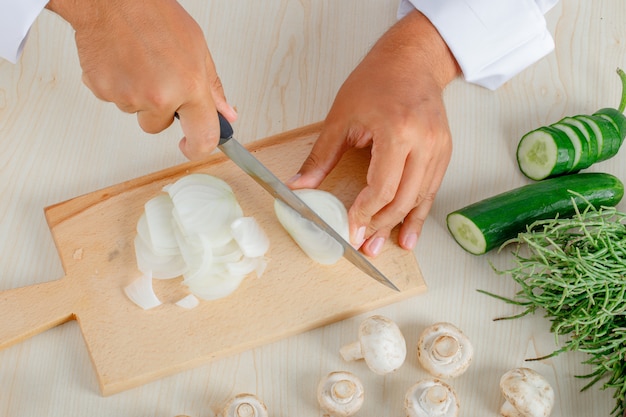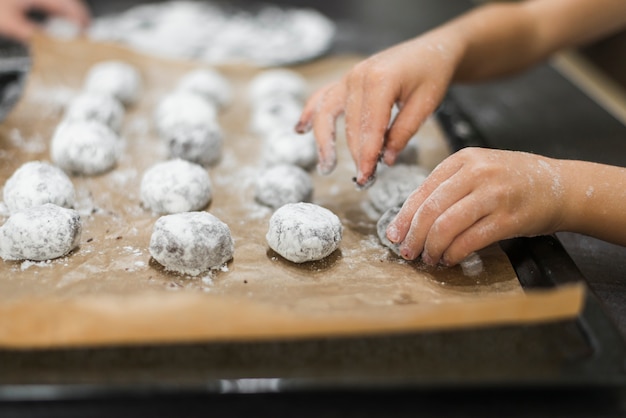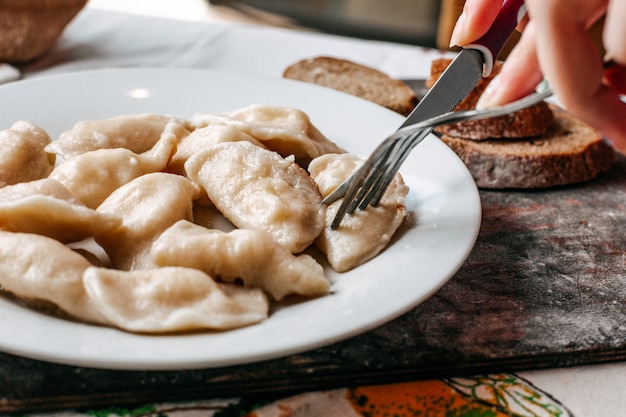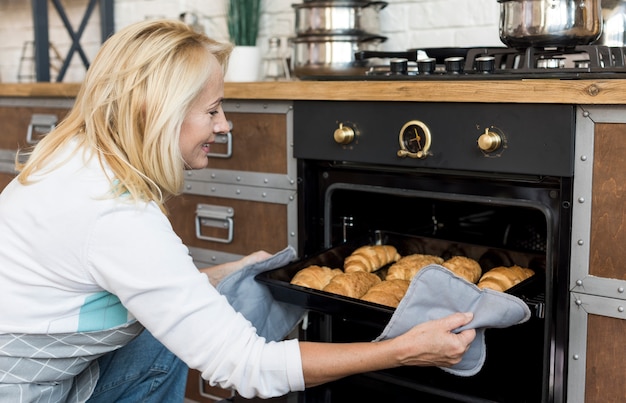Let's talk about wontons – those delightful little parcels of deliciousness that can be filled with anything from succulent pork and prawns to vibrant vegetables and even creamy cheese. They're a bit of a culinary adventure, I'll admit, but trust me, the satisfaction of making your own is truly rewarding. There's an undeniable joy in biting into a wonton you've crafted with your own hands, knowing you've poured your time and effort into creating something special. But, how long does the whole process actually take? Let's delve into the world of wonton making and break down the steps, from prepping the filling to the final steaming or frying, so you can confidently embark on your own wonton journey.
(Part 1) The Wonton Filling: A Symphony of Flavors

It all begins with the filling, the very heart of your wonton. This is where you get to unleash your creativity, combining your favourite ingredients to create a masterpiece that tantalises the taste buds. For me, it's all about striking the perfect balance – a touch of sweetness, a hint of spice, and a deeply satisfying savory base.
The Classic pork and prawn filling: A Timeless Favourite
This is the go-to for many, and for good reason. It's simple, satisfying, and delivers a potent burst of flavour. Here's my usual approach:
- First, I mince some lean pork and prawns. I use a ratio of about 2:1 pork to prawns, but you can adjust it to your liking. A little fat from the pork is desirable, but you don't want it to be overly greasy. I often use a combination of ground pork and diced pork belly for a richer flavour.
- Next, I add in finely chopped spring onions and garlic. A touch of ginger is also a welcome addition, providing a subtle warming note. I always opt for fresh ingredients whenever possible; it simply makes a world of difference.
- The key to a great filling is to season it generously. I use a blend of soy sauce, oyster sauce, sesame oil, and a dash of white pepper. I often throw in a pinch of sugar as well, just to balance out the saltiness and create a more complex flavour profile. It's all about finding that perfect harmony of flavours, and it takes a bit of experimentation to get it just right. Remember, there's no one "correct" way to make a filling – feel free to experiment and find your own signature flavour.
- Finally, I give everything a good mix, making sure all the ingredients are thoroughly combined. I prefer my filling to have a firm consistency, so I often squeeze out any excess liquid. This helps to prevent the wontons from becoming soggy.
I like to let the filling chill in the refrigerator for at least 30 minutes before assembling the wontons. This allows the flavours to meld and intensify, resulting in a more vibrant and delicious filling.
Going Veggie: Deliciously Diverse Wonton Fillings
Don't think you have to stick to meat! I adore experimenting with vegetarian wonton fillings. Here are a few of my personal favourites:
- Mushroom and Tofu: A hearty and satisfying filling that's packed with umami flavour. I use a mix of mushrooms like shiitake, oyster, and button for a delightful variety of textures and flavours. A drizzle of soy sauce and a dash of black pepper enhance the umami notes.
- Vegetable Medley: I like to use a mix of finely chopped vegetables like carrots, cabbage, bok choy, and bean sprouts, along with some chopped tofu for extra protein and a good balance of flavours. You can add a little sesame oil, soy sauce, and ginger for a fragrant and flavourful filling.
- Spinach and Cheese: A slightly more decadent option. I use ricotta or mozzarella cheese, along with some spinach, garlic, and a touch of nutmeg for a delightful, creamy filling. This filling works well with a hint of lemon zest and a sprinkle of Parmesan cheese.
Don't be afraid to get creative with your vegetarian fillings. You can use any combination of vegetables you like, and you can even add in other ingredients like nuts, seeds, or herbs. The possibilities are endless!
A Little Tip: Make It Ahead of Time
I usually make the filling a day or two before I'm ready to make the wontons. This gives the flavours time to meld, and it also makes the whole process a bit more manageable. Just store it in an airtight container in the fridge until you're ready to use it.
(Part 2) Crafting the Wonton Wrappers: A Delicate Art

Now, the wrappers. You can buy pre-made ones, which is perfectly fine, but there's a real sense of accomplishment in making your own. It's not as difficult as it seems, and the taste of homemade wrappers is simply unbeatable.
The Flour Power: Choosing the Right Flour
The key to a good wonton wrapper is using the right flour. I typically use a blend of plain flour and a little bit of cornstarch. The cornstarch adds a bit of elasticity, which helps the wrappers hold their shape and prevents them from becoming too soggy. I find a ratio of 3 parts plain flour to 1 part cornstarch works well.
Kneading and Rolling: Patience is Key
Once you have your flour mix, add a little salt, and then gradually add water, kneading the dough until it's smooth and elastic. Don't add too much water at once; you want the dough to be firm but not too dry. I find a slightly drier dough easier to work with and prevents the wrappers from becoming too sticky.
Next, divide the dough into small balls and roll them out as thinly as you can. I use a rolling pin, but you can also use a pasta machine if you have one. The thinner the wrappers, the crispier they'll be.
This is the part where you need a bit of patience. It takes a bit of time to get the dough just right. Don't be afraid to experiment with different techniques. Just be sure to keep your work surface well floured so the dough doesn't stick. I often use a cornstarch-based dusting powder for a smoother rolling experience.
Storing the Wrappers: Freshness is Important
Once you've rolled out your wrappers, cover them with a damp tea towel to prevent them from drying out. This way, you can make them a few hours ahead of time. Just keep them covered in the fridge until you're ready to use them. If you're making a large batch of wrappers, you can also freeze them for later use. Just lay them out on a baking sheet lined with parchment paper, freeze them individually, and then transfer them to a freezer bag once they're solid.
(Part 3) Assembling the Wontons: A Careful Hand

Alright, now the fun part – assembling the wontons. This is where you get to unleash your creativity. There are countless ways to fold a wonton, but here are a few basic techniques that I love to use.
The Classic Triangular Fold: Simplicity and Elegance
This is the most common and easiest way to fold a wonton. It's quick, efficient, and produces a beautiful, symmetrical shape. Just place a small amount of filling in the centre of a wonton wrapper, then fold it in half to form a triangle. Press the edges firmly to seal the wonton and prevent the filling from spilling out during cooking.
The Purse Fold: A Touch of Charm
This fold is a bit more elaborate, but it's worth the effort. It's a fun little twist that adds a touch of elegance. Fold the wrapper in half, then pinch the two edges together to form a "pouch" or "purse". Gently twist the top of the "purse" to create a neat and secure fold.
The Flower Fold: A Festive Delight
If you're feeling fancy, you can try the flower fold. It's a bit trickier, but the result is stunning. Fold the wrapper in half, then fold it in half again to create a smaller triangle. Pinch the edges together to form a "petal", then repeat the process several times to create a beautiful flower shape. There are many variations of the flower fold, so feel free to experiment and find one that you like.
(Part 4) Cooking the Wontons: A Choice of Methods
Right, the moment of truth. How are you going to cook your precious wontons? There are two main methods: steaming and frying. Both have their own merits and produce delicious results.
Steaming: Light and Delicate
Steaming is a great way to cook wontons if you want a light and delicate dish. It preserves the freshness of the filling and creates a beautifully translucent wrapper.
Simply line a steamer basket with parchment paper, place your wontons in the basket, and steam them for about 8-10 minutes, or until they're cooked through. You'll know they're ready when the wrappers are translucent and the filling is heated through.
For an extra flavorful steam, add a few slices of ginger or a star anise to the water in the steamer pot.
Frying: Crispy and Delicious
Frying is a great option if you want a more crispy and satisfying dish. It adds a delicious crunch and creates a beautiful golden-brown colour.
Heat some oil in a frying pan over medium heat, then carefully drop in the wontons, making sure not to overcrowd the pan. Fry them for about 2-3 minutes on each side, or until they're golden brown and crispy.
Be careful not to overcook them, or the wrappers will become tough and dry. And always make sure the oil is hot enough before you add the wontons. This will help to ensure they cook evenly and get that beautiful crispy texture.
For a more decadent treat, try pan-frying the wontons until golden brown, then transfer them to a baking sheet and bake them in a preheated oven at 350 degrees fahrenheit (175 degrees Celsius) for about 5 minutes. This will give them an extra crispy texture and a hint of toasted flavour.
(Part 5) Serving the Wontons: A Symphony of Flavors
Now, for the grand finale - serving your wontons. It's all about creating a balanced and delicious experience. Here are some ideas to make your wonton feast unforgettable.
Dipping Sauces: A World of Flavors
A great dipping sauce is essential for any wonton dish. It adds a punch of flavour and complements the filling perfectly. Here are some of my favourites:
- Soy Sauce and Vinegar: A classic and simple combination. Just mix equal parts soy sauce and vinegar, and add a little bit of sugar if you like. It's a great way to cut through the richness of the filling.
- Chili Oil: For a bit of heat and spice. You can find ready-made chili oil at most Asian supermarkets, or you can make your own by infusing oil with chili flakes, garlic, and ginger. Add a pinch of Sichuan peppercorns for a complex and aromatic flavour.
- Sweet Chili Sauce: A sweet and tangy sauce that's perfect for those who like a little sweetness in their dipping sauce. It's also great for adding a bit of colour to your dish.
- Sesame Sauce: A nutty and savoury sauce that's made from sesame paste, soy sauce, and rice vinegar. It's a wonderful complement to the flavours of many wonton fillings. You can add a touch of honey or a drizzle of chili oil for a more complex flavour profile.
- Ginger-Scallion Sauce: This sauce is a delicious and refreshing option that is perfect for complementing both steamed and fried wontons. Simply mix together minced ginger, chopped scallions, soy sauce, rice vinegar, and a pinch of sugar.
Accompaniments: A Touch of Balance
Consider serving your wontons with some accompaniments to enhance the flavour and create a well-rounded meal. Here are some ideas:
- Steamed Rice: A classic and comforting accompaniment. It's simple, neutral in flavour, and absorbs the delicious sauces from the wontons. You can also try using brown rice or quinoa for a healthier option.
- Stir-fried Vegetables: A healthy and flavourful side dish. You can use whatever vegetables you like – bok choy, broccoli, carrots, string beans. Just make sure they're cooked to your liking.
- Pickled Ginger: A tangy and refreshing palate cleanser. It helps to cut through the richness of the wontons and adds a nice contrast of flavours.
- Green Salad: A light and refreshing addition to your wonton feast. You can use a simple green salad with a vinaigrette dressing or get creative with a more complex salad that incorporates other vegetables, fruits, or nuts.
(Part 6) Storing and Reheating: Keeping the Goodness Fresh
You've made a batch of delicious wontons, but what about leftovers? Here's the best way to store and reheat them to keep their flavour and texture intact.
Storing Wontons: Keeping Them Fresh
For the best results, store your cooked wontons in an airtight container in the refrigerator for up to 3 days. If you're freezing them, lay them out on a baking sheet lined with parchment paper to prevent them from sticking together. Once they're frozen solid, transfer them to a freezer bag or container. Frozen wontons can be stored for up to 3 months.
Reheating Wontons: Bringing Back the Flavour
Reheating wontons is simple. You can either steam them for a few minutes or reheat them in a frying pan with a little bit of oil. If you're reheating them from frozen, make sure they're completely thawed before you cook them. You can also reheat them in the microwave, but this may result in a slightly softer texture.
(Part 7) wonton variations: Exploring the World of Flavors
Wontons are incredibly versatile. You can change up the filling, the wrapper, and the cooking method to create endless variations. Here are some ideas to get your creative juices flowing.
Sweet Wontons: A Delightful Treat
Who says wontons have to be savoury? Try filling them with a sweet and creamy mixture of mango, coconut, and cream cheese. You can even add a sprinkle of toasted coconut for extra flavour and texture. These sweet wontons are delicious served warm with a drizzle of honey or a scoop of vanilla ice cream.
Wonton Soup: A Warm and Hearty Dish
Wontons are perfect for adding to soup. Just add them to your favourite soup broth and cook them until they're heated through. I love adding wontons to chicken noodle soup, but you can also try them in a vegetable broth or a spicy Thai soup. For a more luxurious soup, try adding wontons to a creamy mushroom soup or a rich tomato bisque.
Deep-fried Wontons: Crispy and Delicious
For an extra crispy treat, try deep-frying your wontons. Just heat enough oil in a deep fryer or a large saucepan to reach a temperature of 375 degrees Fahrenheit (190 degrees Celsius). Then carefully add the wontons in batches, making sure not to overcrowd the pan. Fry them for about 2-3 minutes, or until they're golden brown and crispy.
Serve your deep-fried wontons with a dipping sauce of your choice. For a more decadent treat, sprinkle them with sesame seeds or chopped scallions.
(Part 8) FAQs: Answers to Your Wonton Questions
I know there are a lot of questions about making wontons. So, here are a few frequently asked questions and their answers.
FAQs
| Question | Answer |
|---|---|
| How long do homemade wontons last in the fridge? | Homemade wontons can last in the fridge for up to 3 days. Just store them in an airtight container to prevent them from drying out. |
| Can I freeze homemade wontons? | Yes, you can freeze homemade wontons. Just lay them out on a baking sheet lined with parchment paper to prevent them from sticking together. Once they're frozen solid, transfer them to a freezer bag or container. |
| What's the best way to reheat wontons? | You can reheat wontons by steaming them for a few minutes or reheating them in a frying pan with a little bit of oil. If you're reheating them from frozen, make sure they're completely thawed before you cook them. |
| What are some different ways to fill wontons? | You can fill wontons with all sorts of ingredients, including meat, vegetables, cheese, and even sweet fillings. Get creative and experiment with different flavour combinations! |
| What is the best dipping sauce for wontons? | The best dipping sauce for wontons is a matter of personal preference. Some popular options include soy sauce and vinegar, chili oil, sweet chili sauce, and sesame sauce. Experiment with different sauces to find your favourite! |
So, there you have it. My ultimate guide to making homemade wontons. I hope you find it helpful. Remember, the most important thing is to have fun and experiment with different ingredients and techniques. You'll soon find your own favourite ways to make these delicious little parcels. Happy wonton making!
Everyone is watching

Prime Rib Roast Cooking Time Chart: Per Pound Guide
Cooking TipsPrime rib roast. Just the name conjures images of lavish dinners, crackling fires, and hearty laughter. It’s ...

How Long to Bake Potatoes in the Oven (Perfect Every Time)
Cooking TipsBaked potatoes are a staple in my kitchen. They're incredibly versatile, delicious, and surprisingly easy to m...

Perfect Rice Every Time: The Ultimate Guide to Cooking Rice
Cooking TipsAs a self-proclaimed foodie, I've always been a bit obsessed with rice. It's the foundation of countless cuisi...

The Ultimate Guide to Cooking Asparagus: Tips, Techniques, and Recipes
Cooking TipsAsparagus. The mere mention of this spring delicacy conjures up images of vibrant green spears, crisp and burs...

Ultimate Guide to Cooking the Perfect Thanksgiving Turkey
Cooking TipsThanksgiving. Just the word conjures up images of overflowing tables laden with delicious food, the scent of r...
